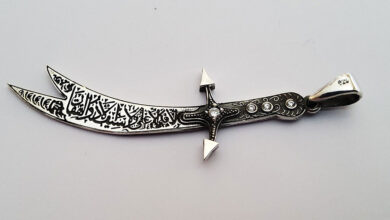
Ghībah (Arabic: غِیبَة, backbiting) is speaking maliciously about someone in one’s absence. It is one of the major sins in Islam which has been explicitly prohibited. The Qur’an has drawn an analogy between backbiting and the abhorrent act of eating the flesh of one’s dead brother. In hadiths it is described as more sinful than Adultery. Other than backbiting, listening to it is also haram (forbidden). Ghibah is considered as violation of haqq al-nas (right of the people) so repentance from this sin depends on forgiveness from the one who was backbitten. Hadiths have counted various consequences and punishment for backbiter such as: transference of the good deed of the backbiter to the backbitten person and transference of the sins of the backbitten person to the backbiter.
Definition
Ethically, ghibah is saying what will cause displeasure of your brother in faith in his absence, whether it is about an impairment in his body, lowness of his lineage, negative trait or his action or saying, or something that is related to him.
Speaking directly about these things is not the only way of ghibah, even an ironic comment, writing or pointing by hand could be a way of committing ghibah. It is narrated that a woman came to Aisha. When the woman was leaving, Aisha pointed at her implying that she was short. The Prophet (s) said: “You have backbit her.”
Ghibah is a true statement about someone that displeasures him/her. If the statement is false about the person it will be Buhtan (slander) which is another sin – a mixture of lying and backbiting.
However, speaking and talking about the good deeds of others is not ghibah.
Rulings
Ghibah is unanimously forbidden. Moreover, this ruling is counted as one of the essential rulings in jurisprudence. Similar to committing ghibah, listening to it is Haram and is one of the major sins.
It has been narrated from the Prophet (s) that if someone avert a ghibah from one’s brother in faith, God will close thousand doors of evil on one, in this world and the Hereafter.
Haqq al-Nas and Haqq Allah
Ghibah is not only violation of haqq Allah (right of God) but also violation of haqq al-nas (right of the people). It is said that God will not forgive the backbiter unless the one who was backbitten forgives him/her. In his will to Abu Dhar the Prophet (s) said: “Be afraid of ghibah, for it is worse than fornication.” Abu Dhar asked: “Why? O, Apostle of Allah!” The Prophet (s) said: “Because if a fornicator repents, God forgives him/her, but the backbiter will not be forgiven unless his fellow forgives him/her.”
Cases of Permitted Ghibah
Although ghibah in one of the major sins, it is permitted in some cases in which a more important expediency existed. Narrations from the Prophet (s) and Imams (a) have counted these cases, some of which are: complaint about an oppressor, and forbidding the evil (al-Nahy ‘an al-Munkar), asking and inquiring (about jurisprudential ruling of something), the people of innovation (Ahl al-Bid’a) and someone who commits sins publicly (only about one’s public sins, not the sins one commits secretly).
However, even in these cases it is better not to backbite unless that a considerable harm will come to somebody or the society.
In the Qur’an and Hadith
The Qur’an has drawn an analogy between backbiting and the abhorrent act of eating the flesh of one’s dead brother. In hadiths, also, condemning statements have been used about the backbiter. The Prophet (s) said: “Whoever Muslim, men or women, backbites, God will not accept his/her prayers and fasts for 40 days, unless the one whom he backbit forgives him”, “ghibah is more effective in destroying a Muslim’s faith than leprosy in his body”, “ghibah transfers the good deeds of backbiter to his fellow and the sins of the backbitten to the backbiter.”
Imam al-Sadiq (a) counts envy as one of the roots of ghibah and says that ghibah will take a faithful Muslim out of the guardian of Allah and enter him to the guardian of Satan.
Methods of Quitting
Ethics scholars have suggested ways for quitting this sin such as considering and focusing on verses and hadiths which dispraise ghibah, thinking about death, keeping away from the opportunities of ghibah.
Based on hadiths, Imam Khomeini introduced two types of methods for leaving this moral problem and believed that one can quit this major sin by following these steps:
Theoretical Method
Pondering about the negative consequences of ghibah, which have been mentioned in hadiths, can prepare one’s mind to quit this sin. Some of the negative consequences mentioned in hadiths are:
- Disgrace among people
- Falling into disrepute among people
- Incurring enmity in people’s hearts
- Enmity between God and angles, and the backbiter
- Eternal hell
- Transference of the good deeds of the backbiter to the one he backbit
- Transference of the sins of the one who was backbitten to the backbiter
Practical Methods
- Training the soul to stop ghibah
- Holding the tongue
- Calculation and watching one’s actions




